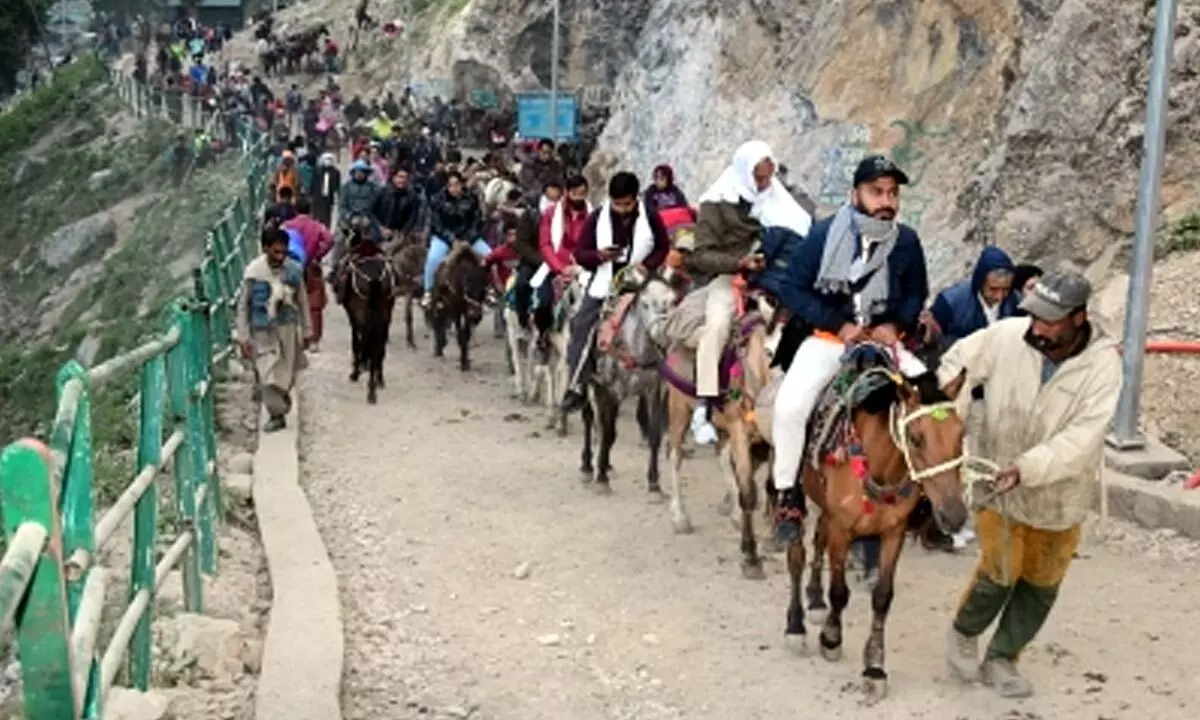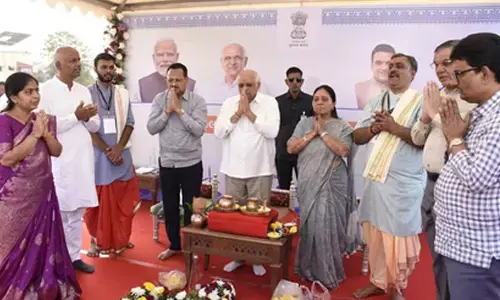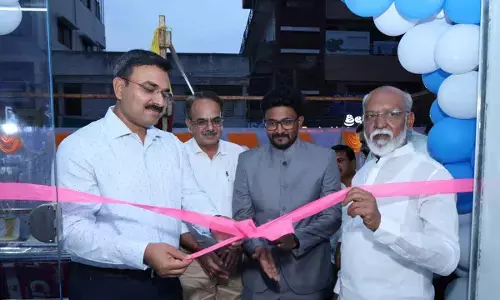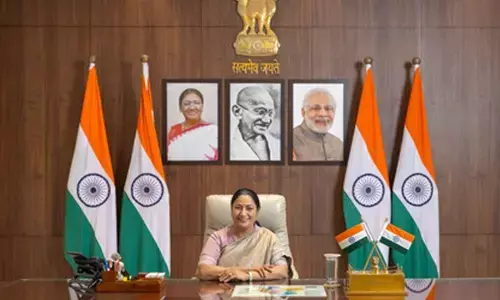Amarnath Yatra resumes with a 'smart' makeover

Amarnath Yatra resumes with a 'smart' makeover (Photo/IANS)
In the lap of the Himalayas began the journey of lakhs of devotees on June 30 to catch a glimpse of Lord Shiva in the form of an Ice Lingam.
Srinagar: In the lap of the Himalayas began the journey of lakhs of devotees on June 30 to catch a glimpse of Lord Shiva in the form of an Ice Lingam. 2,750 pilgrims set off from the base camp for the journey that takes about three days on foot with the night halts at Sheeshnag and Panchtarni.
The Jammu and Kashmir administration is expecting more than six lakh pilgrims this year, after three years of postponement of this annual event.
Since the beginning of the year, Lieutenant Governor Manoj Sinha has been building the machinery for a smooth and safe yatra. The pilgrimage will continue for 43 days till August 11, the day of Raksha Bandhan as per the tradition. The LG is personally supervising all the Yatra arrangements.
The enthusiasm and attendance of the Yatris are enough to prove that the devotees know they are in safe hands. Rather than "negotiating" for peace, the UT administration has uprooted the very eco-system of terrorism.
A five-tier security system is in place. The Yatris will be prioritised for NH-44, the only permissible vehicular route. Traffic will be redirected so that the general public is not inconvenienced.
The pilgrim vehicles have RFID-based (Radio Frequency Identification) tracking and surveillance which will note each person's movement on the route. All pilgrims have a wristband fitted with microchips connected to satellite towers to track their movements.
For those who cannot make it to Amarnath, the government is bringing Lord Shiva to them via an 'online' darshan of the Ice Lingam.
The journey will take two courses -- the traditional 48-km from Nunwan to the cave shrine from Pahalgam in south Kashmir's Anantnag, and the more challenging 14-km Baltal route in the Ganderbal district in central Kashmir. Shelter sheds are dotted along both routes.
Eight base hospitals have been set up on the Baltal route and 20 on the Pahalgam route, along with medical camps on the way. The insurance cover has been increased from Rs 3 lakh to Rs 5 lakh. The Shrine Board is also providing free-of-cost battery car service for pilgrims on the 2.75 km-long Baltal-Domel stretch. Other facilities include optical fiber cable through the entire route of the Yatra for telecom connectivity.
J&K UT has prioritised the protection of the delicate ecosystem of the Himalayas. Environmental welfare and youth-led sustainable tourism are at the forefront of all initiatives.
The Yatra is equally important to the locals as a source of income. The government is employing 35,000 labourers and 5,000 extra ponies into service.
Shri Amarnathji is not just a religious pilgrimage for J&K; it is an opportunity to showcase the UT's cultural heritage and hospitality. Contrary to the portrayal in the media, there is a strong bond between the locals and pilgrims. The welcoming nature of Kashmiris is well known in India. They consider it their duty to ensure the Yatris' comfortable stay and experience in the UT.
A new Yatri Niwas with state-of-the-art facilities and a capacity of 3,600 pilgrims has been constructed in Ramban at the cost of Rs 47 crore within a record span of 14 months. Chanderkote Yatri Niwas is spread over 23 kanals. Being an important stop in the journey of Baba Barfani, it contains 17 dormitories in G+2 dimensions with all modern facilities, modern toilets, fire extinguisher equipment, signages, LED down lighters, etc. The Niwas has eight holding capacities for passengers, best-in-class medical, and for the first time -helicopter services on new routes.
The smaller camps are equipped with fans, mosquito nets, ample charging points, a langar facility, sanitation measures, and waste management and segregation systems.
The National Disaster Response Force (NDRS) and the State Disaster Response Force (SDRF) have undergone specialised training to be a part of the Mountain Rescue Teams (MRTs) of JK Police. They are deployed at a few difficult terrains on the Yatra routes.
CRPF companies are deployed to ensure incident-free pilgrimage. Other companies include BSF, ITBP, Sashastra Seema Bal (SSB), CISF, and of course the Indian Army, stationed at functional areas on the route. J&K's security agencies and central intelligence are working closely to keep an eye on notorious border activities.
The Amarnathji Shrine Board Android mobile app can be launched in five languages- Hindi, English, Punjabi, Gujarati, and Telugu to keep the Yatris updated on all important information and advisories.
Kashmir has been known for its history of composite culture and pluralistic ethos. Kashmiris have always held their arms wide open and amalgamated with all cultures and religions to form what it is today. Amarnath Yatra is at the core of this belief system. The Valley sees the pilgrimage as a symbol of communal harmony. The Muslims hold reverence for this Yatra and volunteer in any small jobs related to it seeing it as a blessing of Lord Shiva, almost like metaphysical divinity.
Although much effort has been made to popularise new tourist destinations as a means of income generation and alter the attitude of mainland India towards J&K, the reality remains that despite everything projected in the media, the annual pilgrimage has never been seen as a source of economic gains by the Kashmiris. In both the good and bad times in the Valley, the sanctity of the Shri Amarnathji Yatra has never reduced for the locals. Kashmiris have always seen it as an honour and pride to host the passengers enroute to the holy cave.








